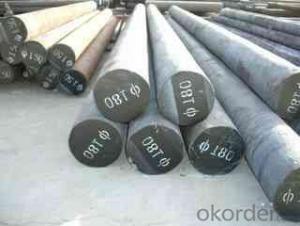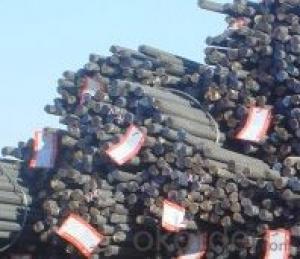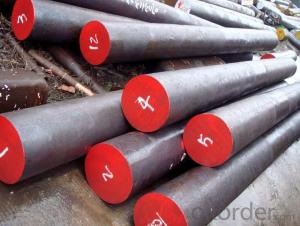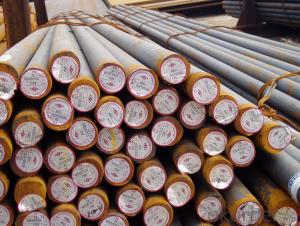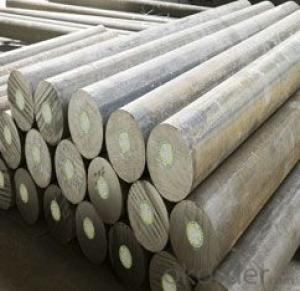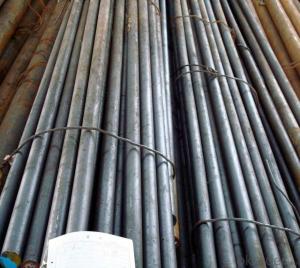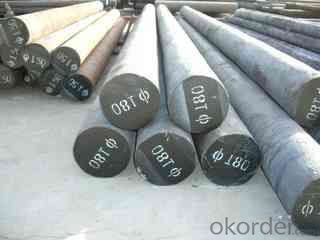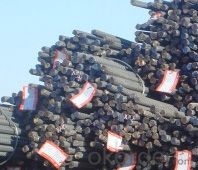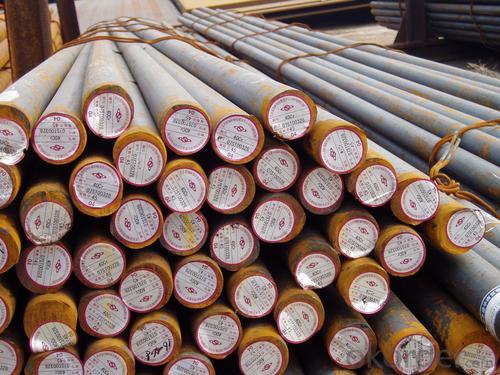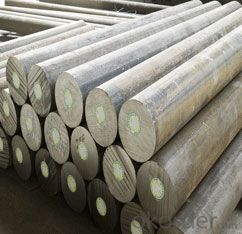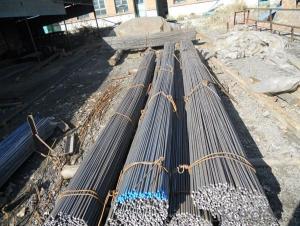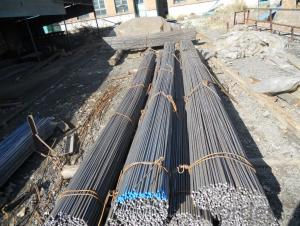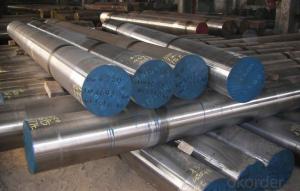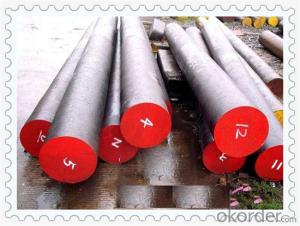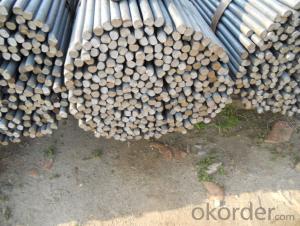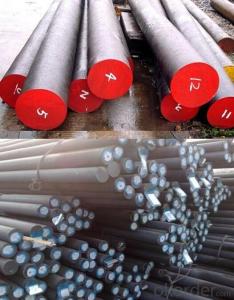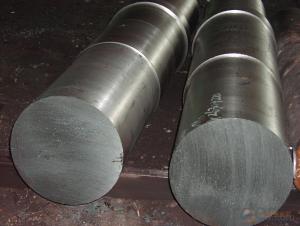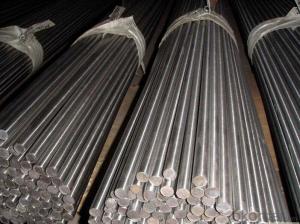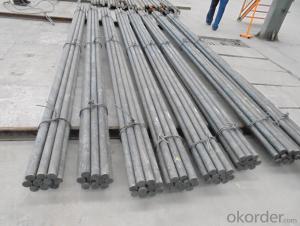JIS /GB/DIN alloy round steel bar 100*100
- Loading Port:
- Tianjin
- Payment Terms:
- TT OR LC
- Min Order Qty:
- 200 m.t.
- Supply Capability:
- 10000 m.t./month
OKorder Service Pledge
OKorder Financial Service
You Might Also Like
Product Description:
Specifications of American Standard Round Bar
1. Grade: ASTM A36; AISI 1006-1025
2. Sizes: Diameter: 6mm-150mm; Length: 6m, 9m, 12m or as customer’s request
3. Tolerance: Within ±5% for weight; ±2mm for diameter
4. Type: Mild steel; Low carbon steel
5. Shape: Round bar, solid bar of steel with circular section
6. Technique: Hot rolled or cold drawn
7. Mass: Mass (kg/m) = Diameter (mm) × Diameter (mm) × 0.00617
Usage and Applications of American Standard Round Bar
1. American standard is the most common form of steel as its price is relatively low while it provides material properties that are acceptable for many applications. American standard round bar is often used where large amounts of steel need to be formed, for example as structural steel.
2. And we can use this kind of product on the performance of the mechanical parts if the demand is not very high.
3. Steel round bar is used in construction and a large number of architectural and engineering structures.
4. Some special round bar can be used for automotive engine and transmission components, bearing, rails machine tools and wire rope.
Packaging & Delivery of American Standard Round Bar
Packaging Detail: All goods are packed in bundle with steel strips and shipped by break bulk vessel or container (depend on target market and different ports)
Delivery Detail: 45 days
Trade terms: FOB, CFR, CIF
MOQ: 25 tons per specification; we can negotiate the quantity if the specification is normal or we have stock of one specification.
Weight: The price invoicing on theoretical weight basis or actual weight basis depends on customer’s request.
Shipment: The shipment of bulk break or container is depends on customer’s request and the situation of the port of destination.
Documents given: Full set of original clean on board bill of lading; Original signed commercial invoice; Original packing list; Policy of insurance; Certificate of origin and what the target market needs.
Production Flow of American Standard Round Bar
The common processes are preheated forging quenching, dual refinement solution process, cooling quenching and isothermal quenching. We use heat treatment for dual refinement solution process.
Quality Assurance of American Standard Round Bar
1. We will strictly inspect our production that we sold according to the customer’s request.
2. Quality should be in conformity with the specification of the manufacturer. Quantity and packing conditions should be in conformity with the term in the contract.
3. Should the packing found damaged, the buyer has the right to claim to the seller.
- Q: What are the different types of steel round bars available in the market?
- There are several different types of steel round bars available in the market, each with its own unique characteristics and applications. Some of the most common types include: 1. Mild Steel Round Bars: These are the most commonly used type of steel round bars due to their versatility and affordability. They have a low carbon content and are easy to weld and machine, making them suitable for a wide range of applications. 2. Carbon Steel Round Bars: Carbon steel round bars have a higher carbon content than mild steel, which gives them increased strength and hardness. They are commonly used in applications that require high strength, such as construction and machinery manufacturing. 3. Alloy Steel Round Bars: Alloy steel round bars are made by adding various alloying elements, such as chromium, nickel, or molybdenum, to improve their mechanical properties. These bars offer enhanced strength, toughness, and resistance to wear and corrosion, making them ideal for applications in the aerospace, automotive, and oil and gas industries. 4. Stainless Steel Round Bars: Stainless steel round bars are highly corrosion-resistant due to the presence of chromium, which forms a protective oxide layer on the surface. They are widely used in industries such as food processing, pharmaceuticals, and chemical processing, where resistance to corrosion and hygiene are crucial. 5. Tool Steel Round Bars: Tool steel round bars are specifically designed for tooling applications, such as cutting, drilling, and shaping materials. They have high hardness, wear resistance, and heat resistance, making them suitable for manufacturing tools and dies. 6. Duplex Steel Round Bars: Duplex steel round bars are a type of stainless steel that contains both austenitic and ferritic microstructures. They offer a combination of high strength, excellent corrosion resistance, and good weldability, making them ideal for applications in the chemical and petrochemical industries. These are just a few examples of the different types of steel round bars available in the market. The choice of the right type depends on the specific requirements of the application, including strength, corrosion resistance, machinability, and cost.
- Q: What is the thermal conductivity of a steel round bar?
- The thermal conductivity of a steel round bar may differ based on the particular steel type and composition. In general, carbon steel exhibits a thermal conductivity range of 26 to 48 W/m·K, whereas stainless steel typically has a slightly lower thermal conductivity of 15 to 27 W/m·K. Nevertheless, these values are only approximations and can be influenced by factors including temperature, impurities, and alloying elements. It is worth noting that thermal conductivity describes a material's capacity to conduct heat and is commonly measured in units of W/m·K.
- Q: What are the cost considerations for steel round bars?
- Cost considerations for steel round bars can vary depending on several factors. Firstly, the type and grade of steel used in the production of the round bars can greatly impact the cost. Different types of steel, such as carbon steel, alloy steel, or stainless steel, have varying costs due to differences in their composition and properties. Higher grade steel with superior strength and durability will generally be more expensive than lower grade options. Secondly, the size and dimensions of the round bars will also affect the cost. Larger diameter and length of the bars will require more raw material and additional processing, resulting in higher costs. Additionally, specialized shapes or custom sizes may require extra manufacturing steps or tooling, which can increase the overall price. The quantity or volume of round bars ordered can also influence the cost. Bulk orders typically benefit from economies of scale, allowing for reduced unit costs. Furthermore, longer-term contracts or partnerships with suppliers can result in better pricing agreements. Transportation and logistics expenses should also be taken into account. The cost of shipping steel round bars can vary depending on the distance, mode of transportation, and handling requirements. International shipping, for instance, may involve additional customs duties and taxes. Lastly, market conditions and fluctuations in the steel industry can impact the cost of round bars. Factors such as supply and demand, raw material costs, and currency exchange rates can all influence the final price. It is important to stay updated with market trends and work closely with suppliers to negotiate favorable pricing. Considering these various factors, it is crucial to conduct thorough research, compare quotes from multiple suppliers, and evaluate the quality-to-price ratio before making a decision. This will help ensure that the cost of steel round bars aligns with your budget and meets your specific requirements.
- Q: What is the minimum yield strength of steel round bars?
- The minimum yield strength of steel round bars can vary depending on the specific grade and type of steel being used. However, in general, most steel round bars have a minimum yield strength of 36,000 psi (pounds per square inch) or 250 megapascals (MPa). This minimum yield strength is typically required to ensure that the steel round bars have sufficient strength and durability to withstand applied loads and prevent deformation or failure. It is important to note that different applications may require steel round bars with higher yield strengths to meet specific performance requirements.
- Q: Are steel round bars susceptible to corrosion?
- Yes, steel round bars are susceptible to corrosion.
- Q: Can steel round bars be used in the manufacturing of mining equipment?
- Mining equipment manufacturing often incorporates steel round bars due to their strength, durability, and versatility. These bars are commonly utilized in the construction industry, as their ability to be machined, welded, and fabricated into various shapes and sizes makes them the ideal choice for mining equipment. Components such as shafts, axles, gears, and structural supports in mining machinery can all be manufactured using steel round bars. Moreover, their ability to withstand heavy loads and harsh environments makes them the perfect fit for rugged mining conditions. Furthermore, heat treatment can be applied to steel round bars to enhance their mechanical properties, making them even more suitable for the manufacturing of mining equipment.
- Q: What are the limitations of steel round bars?
- When selecting the appropriate material for a specific application, it is important to consider the limitations associated with steel round bars. Firstly, weight is a significant factor to consider. Steel round bars can be quite heavy, especially in larger diameters. This can pose challenges during transportation and installation, especially in situations where weight restrictions are a concern. Secondly, corrosion is another limitation of steel round bars. Although steel is known for its strength and durability, it is susceptible to rust and deterioration when exposed to moisture or certain chemicals. To mitigate this, protective coatings can be used or stainless steel round bars can be chosen as they are more resistant to corrosion. Thirdly, machinability is a challenge with steel round bars due to their high hardness and strength. This can result in increased tool wear, reduced cutting speeds, and longer machining times, leading to higher production costs. Cost is also an important consideration. Steel round bars, especially those made from high-quality alloys, can be relatively expensive compared to other materials. This cost factor may limit their use in applications with budget constraints. In terms of design flexibility, steel round bars come in standard sizes and shapes, which may restrict design options in some cases. Additional processing steps such as cutting or forging may be necessary to achieve a specific shape or size, adding to the overall production cost. Lastly, fatigue strength is a limitation of steel round bars. Although they have excellent strength properties, they can be prone to fatigue failure under repeated or cyclic loading. This is particularly relevant in applications where the material is constantly subjected to stress or vibration. Despite these limitations, steel round bars are still widely used in various industries due to their exceptional strength, reliability, and versatility. However, it is crucial to carefully consider these factors to ensure that the chosen material meets the specific requirements of the intended application.
- Q: Can steel round bars be used in the agriculture industry?
- Yes, steel round bars can be used in the agriculture industry. They are commonly used in various applications such as constructing farm equipment, fencing, and building structures. Steel round bars are known for their strength and durability, making them suitable for heavy-duty tasks in the agriculture sector. Additionally, steel round bars can withstand harsh weather conditions and resist corrosion, ensuring their longevity and reliability in agricultural settings. Overall, steel round bars are a versatile and practical choice for the agriculture industry due to their strength, durability, and resistance to environmental factors.
- Q: What's the difference between bearing steel and round steel?
- Bearing steel refers to the steel used to make bearings. Round steel is generally referred to as round bar steel. One refers to the material, and the other refers to the profiles. Such as bearings, needle roller raw material is round steel, but also bearing steel.
- Q: Can steel round bars be used in the manufacturing of valves?
- Valves can indeed be manufactured using steel round bars. The utilization of steel round bars in valve production is widespread owing to their remarkable attributes of strength, durability, and resistance to corrosion. These round bars can be skillfully machined and forged into diverse valve components, including stems, bodies, and discs. Furthermore, steel round bars offer exceptional mechanical properties, thereby guaranteeing the ability of valves to endure extreme pressure and temperature conditions. Another advantage is that steel round bars can be effortlessly welded or threaded to connect different valve parts. In conclusion, steel round bars emerge as a dependable and highly favored material option for the manufacturing of valves.
Send your message to us
JIS /GB/DIN alloy round steel bar 100*100
- Loading Port:
- Tianjin
- Payment Terms:
- TT OR LC
- Min Order Qty:
- 200 m.t.
- Supply Capability:
- 10000 m.t./month
OKorder Service Pledge
OKorder Financial Service
Similar products
Hot products
Hot Searches
Related keywords
